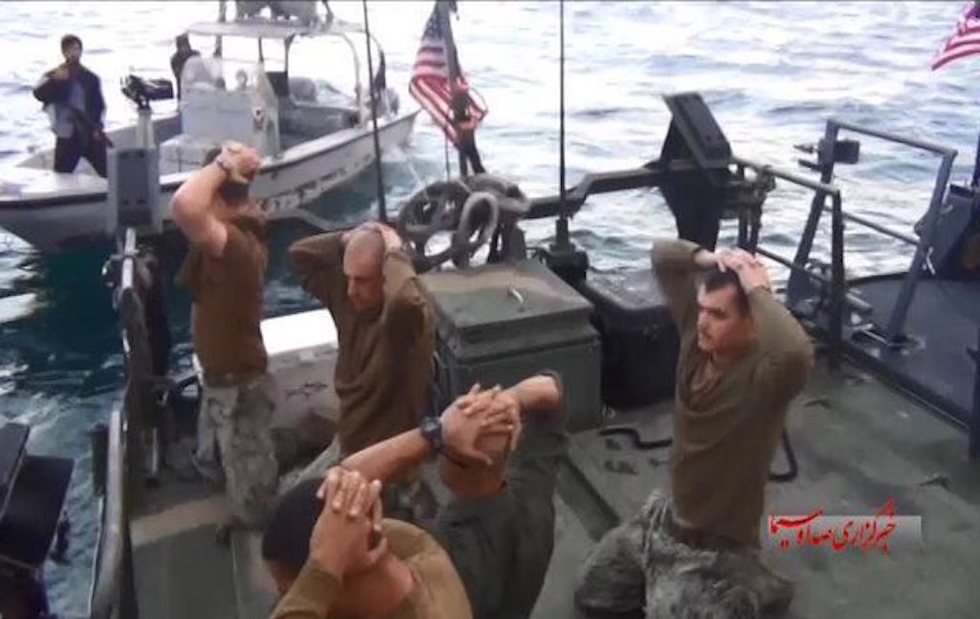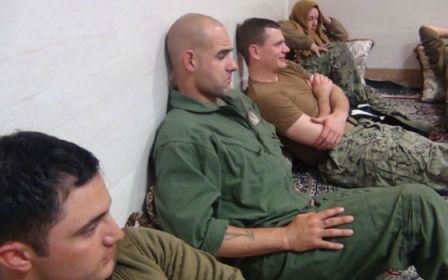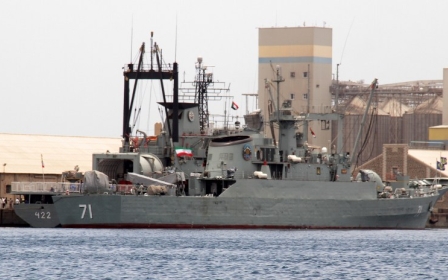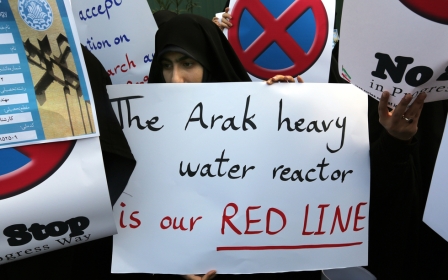Iran's quick release of US sailors suggests new era in relations

Diplomacy is the domain of the mature; not arrogant nouveau-riche, wrote Iranian Foreign Minister Mohammed Javad Zarif on Twitter on Wednesday.
His post, though reportedly aimed at the UAE foreign ministry, may also have raised eyebrows in Washington, coming as it did on the heels of a potential diplomatic incident involving the detention of 10 US Navy soldiers on Tuesday evening.
Iran demanded an apology from the US on Wednesday for the straying of the two navy patrol boats into Iranian waters, though it also released the men unharmed after interrogation.
The relative ease with which the incident passed stands in contrast to previous confrontations.
In 2007, a group of British Royal Navy personnel was detained by the Iranian Revolutionary Guard off the Iran-Iraq coast. Both sides disputed the circumstances - Iran claimed that the UK boats had passed into Iranian territorial waters, while the UK and US maintained that they had remained in Iraqi waters.
The US House Foreign Affairs committee had then slammed the Iranians for the detention saying that the Islamic Republic had “once again ignored international law by seizing sailors in waters outside their jurisdiction".
At a time when the government of George W Bush placed Iran within its notorious “Axis of Evil”, such a reaction was perhaps unsurprising and many have suggested that the cool response to Tuesday’s incident is indicative of thawing relations between Iran and the US.
“The significance of this is its insignificance, that this never actually really led to anything,” said Trita Parsi, the president of the National Iranian American Council. “And that’s pretty big in and of itself.”
“[US President Barack Obama] dealt with this with no bluster and no panic and within 24 hours they were released,” he told Middle East Eye. “John Kerry and Zarif worked the phones, they handled it peacefully.”
“The Iranians even accepted publicly the American explanation, which is that it was an erroneous or broken navigation system.”
A darker history
The holding of officials by Iran is a particular sore spot for the US - following the 1979 revolution that brought the Islamic Republic to power, Iranian students held more than 60 diplomatic officials hostage in the US embassy for 444 days.
The fallout led to a collapse in domestic support for then President Jimmy Carter and a souring of relations between the two countries that lasted decades.
The reaction from the US opposition to this new incident immediately played up this legacy, with many branding the detention of the soldiers a “hostage situation” before the release of any explicit information.
In a Twitter post, following the initial news, US Republican presidential candidate Marco Rubio said that Iran was “testing the boundaries of this Administration’s resolve” and promised to repeal the P5+1 nuclear deal - designed to limit the country's nuclear capabilities - agreed with Iran in July.
Republican frontrunner Donald Trump was even franker, posting on Twitter “we want our hostages back NOW!” even after the soldiers had been released.
Some noted a distinct ratcheting up of tensions from some parts of the American commentariat.
“Iran Revolutionary Guards has surprisingly disappointed warmongers in Tehran and Washington who wanted another US-Iran hostage crisis,” said analyst Negar Mortazavi on Twitter, referring to Iran's military establishment.
Even following the hasty release of the soldiers, some rightwingers were still hyping the incident up:
Many perceived a desire from both governments to prevent a collapse of the nuclear deal, agreed after intense diplomatic negotiations.
A lack of will from either government - even among hardliners in Iran - to see an escalation between the US and Iran, particularly when both countries are heavily embroiled in seeking to resolve the civil war in Syria, has meant that cool heads have prevailed.
“[Then US Joint Chiefs of Staff chairman] Mike Mullen said in 2011 that one of the things that keeps him up at night is that, because of the absence of communication between the US and Iran, a small accident in the Persian Gulf could lead to a major escalation because they couldn’t de-escalate, because they didn’t have communications,” said Parsi.
“Now we’ve seen what the opposite looks like - there was an accident in the Persian Gulf, there was communication and it was quickly defused.”
The International Atomic Energy Agency is expected to report on Friday that the obligations for Iran under the nuclear deal have been fulfilled - this potentially means an end to sanctions and the flowing into the country of billions of dollars of investment, including the immediate unfreezing of $50 billion of cash frozen in overseas accounts.
The risk, therefore, to Iran of any potential incident is very high, particularly as it comes shortly after the destruction of the Saudi embassy in Iran led to a breakdown in relations with many of Iran's neighbours across the water.
"If suddenly something happens outside of the nuclear domain that scuttles the sanctions-easing process, Iran is left in a pretty tricky spot," said Ellie Geranmayeh, a policy fellow at the European Council on Foreign Relations.
"They've actually made all the necessary steps to curtail their nuclear programme and haven't had anything in return by way of tangible sanctions relief so they don't want to put themselves in a situation where you have hawkish members of Congress trying to legislate a new wave of sanctions for Iran's menacing behaviour in the Persian Gulf."
In addition, and contrary to other international spats between the US and Iran, there has been little by way of criticism or dissent from Iran's powerful Revolutionary Guard, often seen as the bastion of conservativism within the Islamic Republic.
"It was actually one of those instances when the IRGC and the Foreign Ministry spoke with one voice and there was a unified position across the board," said Geranmayeh.
'The moderates scored a home run'
Parsi added that if there was any real push from the hardliners in Iran - those who had previously opposed a deal with the Americans over the nuclear programme - to take control of the situation, then they had failed abysmally.
"If it is true that in this case there actually was a struggle in the Iranian government to get this resolved, then the moderates scored a home run, because they got this done in 24 hours." he said.
Concerns over investment also go both ways - the thawing of relations between the US and Iran is potentially a hot-bed for American companies seeking to invest in a largely untapped market.
"There is no denying that the country of almost 80 million people, holder of the world’s third largest reserves of oil and its second largest reserves of mostly untapped gas, has enormous potential," wrote Chris Weafer, an investment analyst, for the Financial Times.
"GDP is expected to be $430bn for the current fiscal year (to March 2016) and is certainly capable of more than doubling over the next seven years if sanctions are taken down as per the agreement with the UN, and they stay down."
Sabotaging a potentially huge market for investment when the lifting of sanctions is so near in sight is unlikely to be appealing for investors - and their allies in the US government - already eyeing up the country's economy.
Overall, said Geranmayeh, this represents an instance where the doves in Washington, those who have pushed for diplomacy against threats of violence or diplomatic isolation, have won out.
"This is one of those first rare cases after the nuclear deal where clearly that momentum of diplomacy has created positive results beyond the nuclear deal itself."
New MEE newsletter: Jerusalem Dispatch
Sign up to get the latest insights and analysis on Israel-Palestine, alongside Turkey Unpacked and other MEE newsletters
Middle East Eye delivers independent and unrivalled coverage and analysis of the Middle East, North Africa and beyond. To learn more about republishing this content and the associated fees, please fill out this form. More about MEE can be found here.




